 Written by Mike Price, OT
Written by Mike Price, OT
A sensory swing provides a soothing and safe environment to calm senses that have been overly stimulated or provide stimulation to facilitate system regulation.
Sensory swings are tools therapists have relied on for years to assist people with SPD, ADHD, or Autism, but any person can benefit from the increased attention span and improved coordination that sensory swings provide.
Linear movement is usually calming, while circular movement is more stimulating. If you are using a sensory swing in a quiet zone, a back-and-forth swing with gentle, limited movement would be a good choice. If you are placing it in a sensory-stimulating environment, a rotational swing would be appropriate.
If a person needs additional work on balance and posture, or under responds to vestibular input, a swing that allows for more dynamic movement would be a beneficial choice.
To support the proprioceptive system and help the muscle and joint receptors function, extra deep touch pressure can increase spatial boundaries and body awareness.
To work on hand-eye coordination and motor skills, a flat base swing allows the person to sit, kneel, stand, or lay facedown while planning motor tasks.
With standalone and ceiling-mounted swings available, your best choice might depend on whether you own or rent the space where the swing will be used, how movable or portable you need it to be, and what kind of area you have available to accommodate a temporary or permanently placed sensory swing.
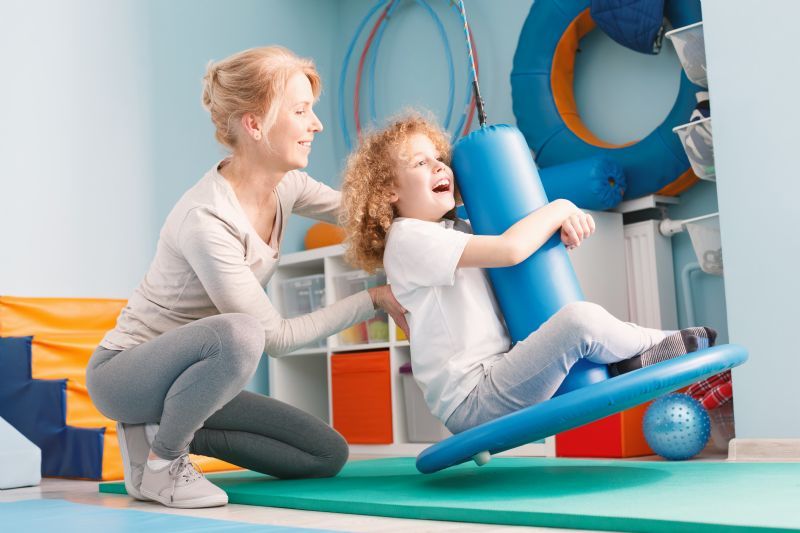
People with Autism and Sensory Processing Disorder (SPD) struggle to filter and organize the sensory input they receive. This stresses the nervous system and can cause sensory meltdowns. A sensory swing is a tool that can soothe or stimulate as needed. Overstimulated senses by calming the “fight or flight” response through sensory input like cuddling and swinging, or can provide the sensory stimulation being craved to balance the nervous system.
Sensory swings stimulate the vestibular system which tells us if we’re moving, how fast we’re moving, and what direction we’re going. As well as the proprioceptive system which tells us our location, movements, and actions. Body awareness, visual skills, balance, and coordination are all supported by the vestibular system. When the input from this system isn’t processed correctly, a sensory swing can help a person make sense of movement.
There are many benefits to sensory swings.
Sensory modulation is the ability to take in, sort, and respond to sensory input. When a child is out of balance, and over or under-stimulated, sensory modulation is compromised. By spending time in a sensory swing, whether because of sensory-seeking or meltdown behavior, the input provided by the swing’s movement and dedicated space assists in achieving sensory modulation. This results in increased self-awareness, spatial awareness, situational awareness, alertness, and level of function.
Some sensory swings come with freestanding frames, some come with slings that can be put into use inside or outside hanging from tree branches, and some hang from doorways and ceilings.
A doorway support bar is easy to install, easy to remove, and it’s portable, while able to accommodate most 2-point suspension swings. Keep in mind your space and environment so you ensure you get a sling that not only fits your needs but also fits into your home.
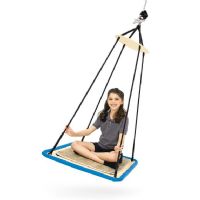 | Advantage Line Platform Swing View Product |
The Advantage Line Platform Swing makes it to the 5th spot on our list because it's a durable and long-lasting sensory integration tool. Therapists can utilize this versatile swing to create a wide range of controlled tilting movements using lines attached to discs at the top, making it applicable for seated, prone, and even standing positions. With a weight capacity of 300 pounds, this swing includes both a carpeted pad and a vinyl pad to customize the seating experience based on user preference. Engineered as a simplified yet economical version of Southpaw's classic model, it upholds the high quality and functionality that Southpaw customers rely on, specifically catering to individuals with sensory integration dysfunction.
The Platform Swing's unique design allows it to deliver a diverse range of tilting movements, enabling therapists and caregivers to tailor sensory experiences for clients. This adaptability makes it an appealing tool for addressing various therapeutic goals and reaching a broad audience, spanning from children to adults.
Constructed for durability and long-term use, the Platform Swing's robust design meets the demands of sensory integration therapy, where equipment undergoes rigorous use. Its straightforward design contributes to user-friendliness, a crucial factor considered by therapists and caregivers when selecting therapy tools.
The Advantage Line Platform Swing is not just a product; it serves as a solution tailored to meet the distinct needs of individuals with sensory integration dysfunction. It aims to provide an enriching sensory experience, assist in motor planning and balance, and offer sensory enrichment, making it an invaluable tool in therapeutic settings.
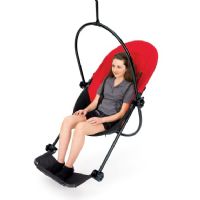 | Variable Axis Sensory Therapy Swing for Special Needs View Product |
Providing linear and rotational swinging, number 4 on our list is the lightweight high-back Variable Axis Sensory Therapy Swing for Special Needs by Southpaw Enterprises. It has an adjustable seat angle to keep users who don’t have well-developed posture control or motor skills seated safely. It can be ordered with a length adjustable footrest, and its optional Safety Rotational Device adds rotational movement to this seat swing.
This swing has been recognized for several of its attributes, and was included in, “5 Best Vestibular Therapy Tools to Improve Balance & Dizziness.” For users at any developmental level, this swing provides vestibular and proprioceptive input that helps develop skills like spatial awareness or the ability to analyze distance, speed, and placement relative to the environment. This valuable therapeutic sensory swing for autism helps develop perception. Users can be positioned comfortably in vertical and horizontal planes.
The cover is washable in cold water and it folds up for easy transport and storage. It can safely accommodate users of 200 pounds.
The multiple configurations of this sensory swing landed it on our list of top 5 choices. It provides a lot of positioning options, not just concerning the environment, but about properly positioning the user to be safe and comfortable. Horizontal, vertical, seat angle, linear swinging, and rotational swinging all contribute to a fun and therapeutic user experience.
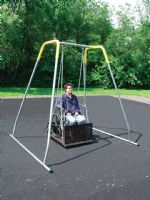 | Wheelchair Swing Platform and Frame by SportsPlay View Product |
The Wheelchair Swing Platform and Frame by SportsPlay made number 3 on our list for its accessibility alone. This swing proudly features front and rear ramp access, and the platform itself is coated in a non-slip vinal-coated steel platform so you can rest assured that your loved one can swing safely.
Swinging offers cognitive and physical benefits, including proprioceptive input and sensory integration, and the Wheelchair Swing Platform allows individuals in wheelchairs of all ages to enjoy swinging, either independently or with peers. It minimizes the risk of falling and the discomfort associated with transitioning from a wheelchair to a swing. The platform measures 32" wide by 38" long to accommodate most wheelchairs.
Various options are available, including the frame only in portable and permanent variations, the swing platform only, and portable and permanent full systems with the frame and swing platform. The durable steel frames are well-constructed and feature four legs capable of supporting up to 800 lbs. The swing platform comes with the platform, chains, and S-hooks and is intended for frames 8' high. For a complete swinging system, portable and permanent options are available, which include the frame, swing platform, chains, and S-hooks.
For promoting spatial awareness and providing deep touch pressure, the Indoor Sensory Compression Swing by Harkla earned the number 2 spot on our list.
This swing is designed with children who have Autism, SPD, and ADHD in mind, as its deep touch pressure diminishes sensory overload and lowers anxiety and stress, replacing those feelings with calmness and emotional control. The back-and-forth, side-to-side swaying creates vestibular input to help foster spatial awareness and the body’s ability to detect it. An optional 360-degree Swing Swivel can be ordered so your child can spin and add another level of activity and fun to this swing.
This sensory swing is strong and durable as well as stretchy and compressive, delivering the feeling of a hug or a cuddle for the user. It can safely hold up to 200 pounds, and comes with hardware to attach it directly to all ceilings, no matter the height. It is a cozy private space that kids will enjoy using for playtime or downtime.
The personal retreat this swing creates is very flexible depending on what the user needs most. It can facilitate efficient homework time, provide a safe time-out space to get re-balanced, teach spatial awareness, or just be a fun swing for play. Parents love it, kids love it, and we know you’ll love it too, which is why it finished in the top 3 of our list. For a flexible multi-featured sensory swing, your kids will get lots of use out of this.
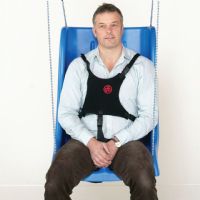 | High Backed Full Support Swing Seats View Product |
The High Backed Full Support Swing Seat by TFH made number 1 on our list because it's designed to cater to the needs and provide support of individuals of all ages and sizes living with special needs. The swing's tilt, or rake, can be adjusted, along with the overall height of the ropes.
Made from UV-treated material, the seat and ropes will retain their original color even after years of sun exposure. The inclusion of safety snap buckles and adjustable harness straps ensures that individuals using this swing will remain secure, regardless of the level of enjoyment.
This swing seat features an enlarged back support tailored for children, teenagers, and adults living with special needs. Additionally, it includes a pommel that serves as an upward curve designed to provide pelvic support, similar to a saddle. The adjustable safety harness straps feature durable snap buckles. The entire unit, from the ropes to the seat, is constructed with UV-resistant material, ensuring long-lasting color retention after continuous sun exposure.
Manufactured from high-density polyethylene, a robust yet soft plastic commonly used in household items, the seat and backrest offer durability and comfort. The ropes are adjustable in terms of height above the floor and the degree of tilt, suitable for 10-foot high frames.
All components are rigorously strength-tested and guaranteed for durable, lifelong use when properly maintained. The child size supports up to 100 pounds, the teenage size holds up to 180 pounds, and the adult size accommodates up to 280 pounds.
For people with sensory needs, SPD, ADHD, or Autism, sensory swings are a very useful tool for improving sensory processing. This, in turn, helps patients get the sensations they need for system regulation or helps them calm down when overstimulated. With the multiple features provided by our top 5 best sensory swings, you can be confident you’ll find a model that will fit your individual needs and serve the person well.
For more tips, tricks, top 5 lists, and rehab information, please visit us at Caregiver University!

Co-Founder of Rehabmart and an Occupational Therapist since 1993. Mike has spent his professional career working in multiple areas of Occupational Therapy, including pediatrics, geriatrics, hand therapy, ergonomics and inpatient / outpatient rehabilitation. Mike enjoys writing articles that help people solve complex therapeutic problems and make better product choices.